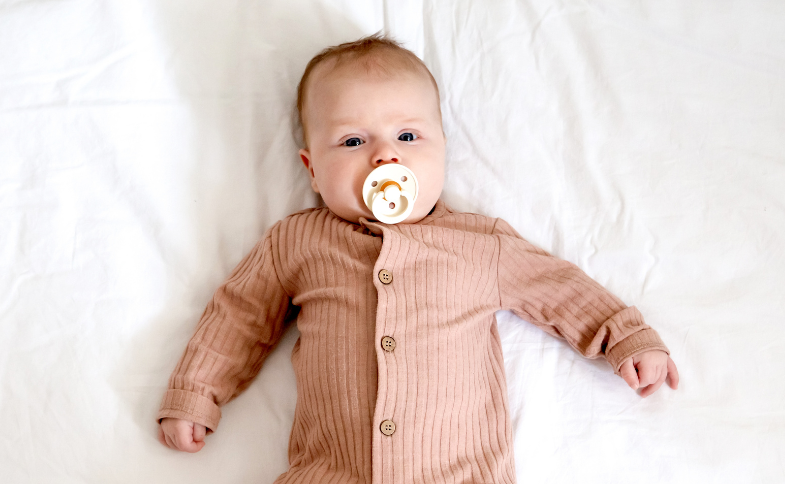Creating Healthy Sleep Habits for Your Baby

As a new parent, you're probably exhausted. Getting your baby to sleep through the night is one of the biggest challenges for many new parents. You're up all night with a crying baby, and you're not sure what to do to get them to sleep. And then the lack of sleep leaves you feeling frustrated, exhausted, and overwhelmed. And you find yourself thinking that whoever came up with the phrase ‘sleeping like a baby’ clearly had never had kids!
You're not alone. Many parents struggle with sleep deprivation in the early days of parenthood. The good news is that you can develop healthy sleep habits for your little one to help them (and you!) get the rest you need. That’s what we’ll focus on in this guide.

How to create healthy sleep habits for your baby
Newborns typically sleep for 16-17 hours a day, but those hours are spread out in short bursts. As your baby grows, sleep patterns change, and they start developing a more structured sleep routine.
Here are some of the things you can do to help your baby develop healthy sleeping habits:
1. Create a bedtime routine
Babies thrive on consistency and scheduling. Try to put your baby to bed around the same time every night. Having a predictable bedtime routine signals to your baby's body that it's time to wind down and get ready for sleep.
Your bedtime routine could include things like:
- Giving your baby a bath
- Put on pajamas
- Reading a book
- Singing a lullaby
- Turning down the lights
Make sure your bedtime routine is consistent, and do it at the same time every night. This will help your baby learn to expect it, and they'll start to get tired when they see you start the routine.
2. Stick to a sleep schedule
Another important tip is to stick to a sleep schedule. This means putting your baby to bed at the same time each night and waking them up at the same time each morning, even on weekends.
It may take a few weeks for your baby to adjust to a sleep schedule, but it's worth it in the long run. Once your baby is used to a regular sleep schedule, they'll be more likely to fall asleep and stay asleep at night.

3. Know the signs of sleepiness
Babies, like adults, give cues when they're tired. Watch out for signs of sleepiness, such as yawning, rubbing eyes, or getting fussy. Putting your baby down to sleep when they show these signs can prevent overtiredness, making the bedtime routine smoother.
4. Pay attention to wake windows
Your baby has short periods of time when they are naturally alert and awake between naps. Paying attention to these “wake windows” helps ensure your baby is tired enough to sleep well at bedtime.
At 6 months, your baby's wake window may be 1.5-2 hours. Watch for signs of tiredness like rubbing eyes or getting fussy. Start winding down for naptime about 10 minutes before your baby reaches the end of their wake window.
5. Create a restful sleep space
Babies sleep best in a dark, quiet, and cool room. Make sure your baby's room is free of distractions, and keep the noise level down. Blackout curtains or shades will help block light that can disrupt sleep. A white noise machine or sound soother can also dampen distracting household sounds.
The ideal temperature for a baby's room is between 68 and 72 degrees Fahrenheit. If your baby's room is too hot or too cold, it can make it difficult for them to fall asleep and stay asleep.
Additionally, remember that your baby should sleep on their back on a firm, flat mattress with no pillows, blankets, or stuffed animals that could pose a suffocation risk. A basic crib or bassinet is all your little one needs!
For more information, be sure to check out our guide on how to create the best sleep environment for your baby.

6. Use a pacifier
If you think a little one needs it, investing in a pacifier might be a smart move. A pacifier may help your baby soothe themselves and fall asleep more easily. It may also lower the risk of SIDS, as it may prevent your baby from rolling over onto their stomach or covering their face with bedding.
That said, you should not force your baby to use a pacifier if they do not like it. You should also avoid attaching it to their clothing or bedding, as this could cause strangulation
7. Be patient
Babies are unique, and what works for one may not work for another. Be patient and flexible in your approach to sleep training. It's normal for babies to have ups and downs in their sleep patterns as they grow and develop.
How much sleep does your baby need?
We’ve talked about this in greater detail when we covered how to create a sleep schedule for your baby. However, the long and short of it is this. The amount of sleep your baby needs depends on their age and individual differences.
In general, babies need more sleep than adults, and they sleep in shorter cycles throughout the day and night. Here are some guidelines for how much sleep your baby might need at different stages:
- 0 to 4 months: Newborns sleep 12 or more hours a day, but only an hour or two at a time. They wake up frequently to feed, change diapers, and interact with you. Their sleep patterns are not influenced by day and night yet, so they might sleep more during the day or more during the night. Breastfed babies usually need to eat more often than bottle-fed babies, about every 2 hours versus every 3 hours.
- 4 to 6 months: Around this age, your baby’s sleep needs drop to 12 to 16 hours a day. They also start to sleep longer at night and may be able to sleep through the night without feeding. However, this is not a rule, and some babies may still need to feed at night or have trouble falling asleep or staying asleep.
- 6 to 12 months: From 6 months onward, your baby does most of their sleeping at night, and may only need 2 to 3 naps during the day. However, other factors such as teething, growth spurts, illnesses, or sleep regressions may cause them to wake up more often at night or have difficulty napping. You may also want to use some sleep-training strategies if your baby is not sleeping well at this stage.
Final Thoughts
Establishing healthy sleep habits takes time but it's worth the effort. Remember, you're not alone in this journey. Many parents have faced the sleep struggle and emerged victorious. With consistency and patience, your baby – and you – will be sleeping peacefully through the night. Sweet dreams!